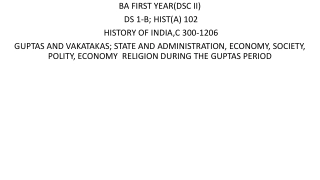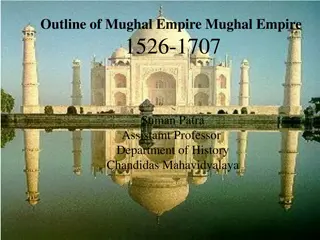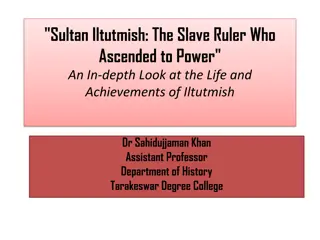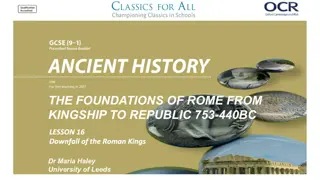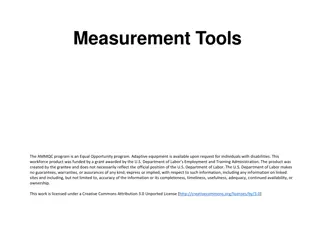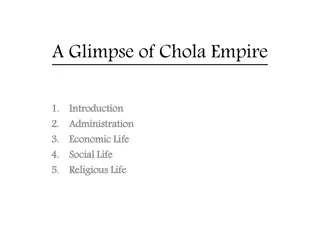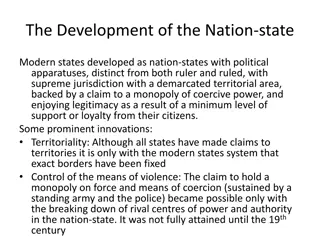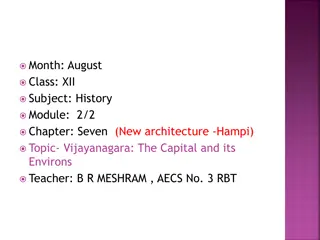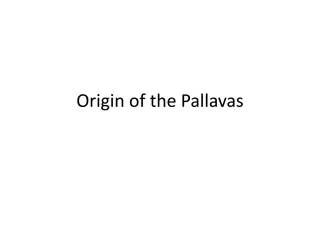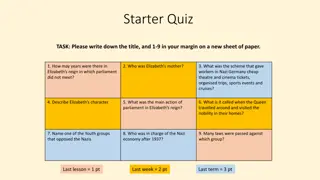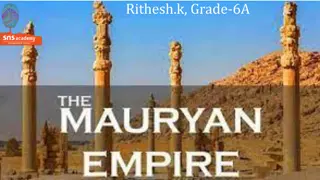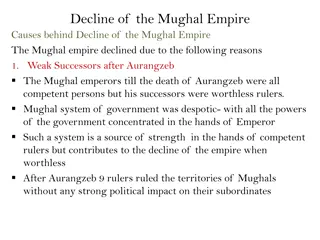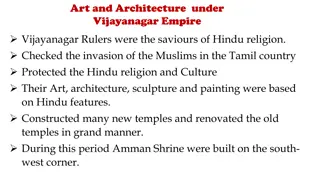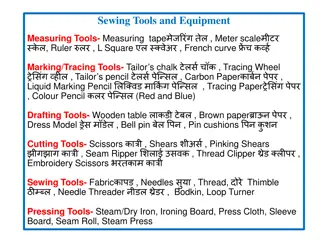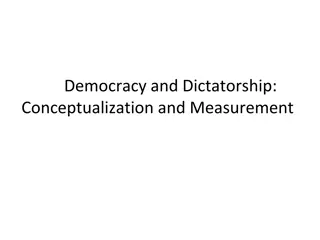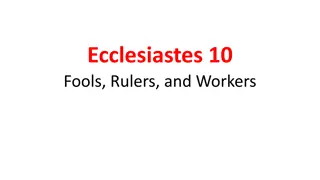Emergence and Expansion of Powers Before the Guptas
Explore the political landscape of ancient India before the rise of the Guptas, including minor powers and rulers like Kushanas, Nagas, Vakatakas, Ikshvakus, and more. Learn about the varied kingdoms and emerging territories shaping the region's history.
6 views • 25 slides
Outline of Mughal Empire Mughal Empire 1526-1707.
The Mughal Empire in India from 1526 to 1707 was a significant period marked by notable rulers such as Babur, Humayun, Akbar, Jehangir, Shah Jehan, and Aurangzeb. These emperors each contributed differently to the empire's development, with highlights including military conquests, administrative ref
7 views • 14 slides
The Pala Empire: Rise and Patronage of Buddhism
The Pala Empire, known for its significant expansion and patronage of Mahayana Buddhism, saw key rulers like Gopala, Dharmapala, and Devapala leading to a cultural flourishing with establishments like Vikramashila and Nalanda universities. Noted Buddhist scholars from this period include Atisha and
2 views • 15 slides
Introduction to Geometry Tools: Circle, Line, Perpendicular, and Angles
This content introduces essential geometry tools like the circle, line, perpendicular, and angles, with details on their construction and applications. Learn about rulers, compasses, protractors, and more for drawing shapes and measuring lengths and angles. Discover how to construct circles, line se
2 views • 12 slides
The Impact of Early Slave Trading in Africa and the New World
Portuguese were the first to establish slave trading patterns in Africa, initially raiding for slaves but later engaging in trade with African rulers. Other European nations followed suit, leading to the emergence of large states like Asante and Dahomey involved in the slave trade. The demand for la
0 views • 13 slides
Sultan Iltutmish: The Slave Ruler Who Ascended to Power
Sultan Iltutmish, the third ruler of the Delhi Sultanate, rose to power from a slave origin. He faced challenges upon ascension, including factional disputes and external threats. Iltutmish implemented administrative reforms, introduced architectural innovations, and strengthened diplomatic ties wit
0 views • 8 slides
Sub-Saharan Kingdoms of Ghana and Mali: Rise and Fall
The Sub-Saharan Kingdoms of Ghana and Mali were powerful empires in Western Africa, known for their wealth in gold and salt trade. Ghana emerged in 500 A.D. as the first great traders in West Africa, with strong rulers and a well-trained army. The empire of Ghana controlled all gold trade and had a
2 views • 17 slides
Social Structure and Privileges in the Pandya Kingdom
The social conditions in the Chola and Pandya periods saw the Brahmins holding a significant position, with rulers granting them land and privileges. The Vellalas were the farmers, known as sons of the soil, and had roles in the court and army. Cowherds were respected and religious, while the mercha
1 views • 11 slides
The Downfall of the Roman Kings: Lucretia's Role in Establishing the Republic
The Rape of Lucretia by Sextus Tarquinius was a key event leading to the downfall of the Roman kings and the establishment of the Republic. Lucretia's character, representing chastity and virtue, inspired Brutus to take a stand against the tyrannical rulers. Brutus's impassioned speech and vow marke
0 views • 6 slides
Understanding Measurement Tools for Mass, Volume, and Density
Explore how to measure length using metric rulers, find mass with balances, distinguish between mass and weight, calculate volume through displacement or dimensions, calculate density, and understand relative density in liquids. Learn about regular and irregular volumes, mass units, weight units, an
1 views • 40 slides
Interactions Between Ancient Greece and Ethiopia: A Historical Overview
Ancient Greece and Ethiopia had significant interactions throughout history. The relationship started with trade and the employment of Greek mercenaries by the Egyptian rulers. Greeks were intrigued by rumors about Ethiopians, leading to explorations and interactions. This period ended with Alexande
0 views • 9 slides
Precision Measurement Tools for Accurate Engineering Tasks
Explore a range of precision measurement tools such as rulers, protractors, calipers, micrometers, and more. Learn about the various parts and functions of a vernier caliper, how to measure with vernier calipers, and the usage of electronic micrometers, depth gauges, and height gauges. These tools a
9 views • 15 slides
A Glimpse of Chola Empire: Rise and Fall of an Ancient Dynasty
The Chola Empire, under rulers like Vijayalaya, Aditya I, and Rajaraja I, witnessed periods of expansion, conquests, and cultural advancements. Their efficient administration, economic prosperity, social structure, and religious practices are discussed, highlighting the empire's zenith under Arumoli
0 views • 11 slides
Evolution of the Nation-State and Modern State Concepts
The development of the nation-state marks a significant shift in political organization, characterized by centralized power, territoriality, and legitimacy gained through citizen support. Key innovations include territorial demarcation, monopolization of coercion, impersonal power structures, and th
0 views • 8 slides
Ancient Kingdoms of Gonds and Ahoms: Legacy and Administration
The Gonds and Ahoms were ancient tribes with rich histories in India. The Gonds, known for their decentralized administrative system led by various clans, had important rulers like Aman Das and Durgawati. Resources like wild elephants brought wealth but fell to the Mughals. The Ahoms, originating fr
0 views • 8 slides
Rajput and Religious Policy of Mughal Emperors: Akbar vs. Aurangzeb
Akbar, the first Mughal emperor, pursued a diplomatic policy towards the Rajputs, aiming to bring them under his suzerainty while maintaining friendly relations. His successor, Aurangzeb, adopted a more aggressive approach, seeking to annex Rajput kingdoms due to religious differences. This shift in
0 views • 6 slides
Vijayanagara: The Glorious Capital of the Vijayanagara Empire
Vijayanagara, the capital of the Vijayanagara Empire, was established by Harihara and Bukka in 1336 on the banks of the river Tungabhadra. Known as Hampi, the city flourished under Krishnadeva Raya, boasting unique architectural styles, sophisticated water management systems, impressive fortificatio
0 views • 17 slides
Exploring the History and Applications of Statistics in Daily Life
The study of statistics, derived from Latin and Italian roots, dates back centuries to aid rulers in governance and decision-making. With advancements in the 20th century and the availability of technology, statistics now plays a crucial role in various sectors like education, business, and sports,
1 views • 55 slides
The Pallavas: Origins, Politics, and Achievements
The Pallavas, an ancient dynasty in South India, had multiple theories surrounding their origin, with some suggesting Persian descent. Their political history saw conflicts with the Chalukyas and a focus on military conquests. Notable rulers like Mahendravarman I and Narasimhavarman I expanded the P
0 views • 7 slides
Classroom Objects Lesson for Grade 2 Students
This lesson focuses on teaching Grade 2 students about classroom objects through images and interactive activities. Students learn to use "What's this?" to inquire about various items like pens, rubbers, pencils, rulers, and books. The lesson includes practice sessions to reinforce learning, ending
0 views • 7 slides
Historical Origins and Formation of German Law: Influence of Roman Law
The historical origins and formation of German law were shaped significantly by the late contact with Roman law during the Medieval and Renaissance period. The weak central imperial power, rising influence of territorial rulers, and the lack of a common legal system in Germany prompted the appeal fo
0 views • 23 slides
Understanding Pattern Making Techniques in Fashion Design
Explore the art of pattern making in the world of fashion design with insights into different types of patterns, dart terminology, and the functions of pattern making tools. Discover how patterns are created, from drafting to draping, and learn about essential tools like plastic grid rulers and Fren
2 views • 24 slides
Understanding Sexual and Gender-Based Violence: A Presentation by Oby Nwankwo at the UN CEDAW Committee
Presentation by Oby Nwankwo at the UN CEDAW Committee on Understanding Sexual and Gender-Based Violence, covering definitions, forms of violence, consequences on women & girls' health, taking action, the VAPP Act, and the role of traditional rulers in curbing SGBV.
0 views • 48 slides
Ancient Civilizations of the Fertile Crescent
Explore the geography and history of the Fertile Crescent, including Mesopotamia, Sumer, and later civilizations like Babylon. Learn about the rich farmland, nomadic lifestyle, irrigation methods, Sumerian achievements in writing, and the rise of empires under rulers like Sargon and Hammurabi.
0 views • 13 slides
Challenges Faced by Female Rulers in History
The challenges encountered by female rulers in history, like Queen Elizabeth I, are explored in this content. From societal attitudes towards women in Tudor times to the pressures to marry and produce heirs, the struggles faced by female monarchs are highlighted. The content delves into historical e
0 views • 10 slides
Hinduism Flourishing in the Pandyan Empire
Hinduism flourished during the period of the Pandyan Empire, with rulers giving extensive donations to Saiva and Vaishnava temples. They provided endowments for temple renovation and maintenance. Notable rulers like Maravarman Sundara Pandyan and Jatavarman Sundara Pandiya contributed significantly
0 views • 18 slides
Overview of Mauryan Empire: Chandragupta, Bindusara, and Ashoka
Mauryan Empire, established by the Mauryas, was the first major empire in India, encompassing a vast territory and surpassing previous dynasties in land control. Chandragupta Maurya, Bindusara, and Ashoka were key emperors who shaped the empire's history. Chandragupta, supported by Chanakya, conquer
0 views • 13 slides
Religious Influence of Nayaks Dynasties in South India
Nayaks Dynasties emerged after the downfall of the Vijayanagara Empire, with Nayak rulers patronizing Hindu religion, promoting Saivism and Vaishnavism, and supporting religious activities. They contributed to the growth of Linga worship, celebrated various festivals, and facilitated the development
0 views • 13 slides
Carnatic Wars in the 18th Century: Conflict between Indian and British East India Companies
Carnatic Wars were a series of military conflicts in the mid-18th century between the Indian Company, British East India Company, and various independent rulers. Total of three wars were fought - First Carnatic War (1746-48), Second Carnatic War (1749-1754), and Third Carnatic War (1757-1763). The w
1 views • 12 slides
Causes Behind the Decline of the Mughal Empire
The decline of the Mughal Empire was influenced by weak successors after Aurangzeb, degeneration of Mughal nobility, inefficiency of the army, economic bankruptcy, foreign invasions, wars of succession, and court factions. The empire faced challenges such as incompetent rulers, weakened military, fi
2 views • 5 slides
Art and Architecture of the Vijayanagar Empire: A Cultural Legacy
The Vijayanagar rulers were patrons of Hindu art and architecture, preserving Hindu culture and religion through the construction of grand temples and halls. Divided into early, middle, and later phases, their architectural feats blended Hoysala and Dravidian styles, creating iconic structures like
6 views • 12 slides
Political Turmoil in Pre-Babur India
Babur, a Turkic ruler, seized power in India in the early 16th century amidst a chaotic political landscape. With weak rulers in Delhi and conflicting powers across the subcontinent, Babur's successful invasion marked a significant shift in Indian history, leading to far-reaching consequences.
0 views • 8 slides
Prophet Muhammad's Outreach Beyond Arabia
Prophet Muhammad expanded the message of Islam beyond Arabia after the Treaty of Al-Hudaybiyah, reaching out to various tribes in Arabia and nations outside, despite varied responses from different rulers. The response from the kings of Persia, Egypt, and Abyssinia, among others, shed light on the P
0 views • 8 slides
Understanding Random vs. Systematic Errors in Statistics Through a Ruler Activity
Engage students in a hands-on activity using paper rulers to differentiate between random and systematic errors in measurements. By measuring objects and analyzing errors, students learn how randomness and consistency impact data reliability.
0 views • 14 slides
Understanding the Significance of Measurement Comparisons
Measurements involve comparisons, leading to uncertainty and the need for estimation between scale divisions. Accuracy in measurement is crucial, as seen in examples such as determining the length of a beetle's body. Estimating the middle value in a range is common practice when expressing measureme
0 views • 43 slides
Historical Overview of 1st Maccabees: Key Events and Characters
The content provides a historical background on the book of 1st Maccabees, focusing on key dates such as the return from Babylonian captivity, construction of the Temple, and the reign of Alexander the Great. It introduces important figures like Mattathias and his sons, highlighting their role in re
2 views • 34 slides
The British Expansion in India: From Trade to Territory
The journey of the British in India from establishing trade through the East India Company to gaining territorial control is explored. The narrative covers the company's strategic moves, conflicts with local rulers, and pivotal events such as the Battle of Plassey that shaped British dominance over
0 views • 16 slides
Comprehensive Guide to Sewing Tools and Equipment
Sewing tools and equipment play a vital role in creating quality garments. Essential tools include measuring tape, rulers, scissors, fabric, needles, and pressing tools. Other tools like tracing wheel, seam ripper, and cutting tools are also crucial for successful sewing projects.
0 views • 4 slides
Evolution of Democracy: From Early Forms to Modern Systems
Explore the evolution of democracy from early forms where rulers sought consent to govern to modern systems of democratic rule. Early democracy emerged when rulers needed to seek the approval of those they governed, leading to limited participation and direct democracy in various societies. However,
0 views • 66 slides
Insights from Ecclesiastes: Fools, Rulers, and Workers
Delve into the wisdom of Ecclesiastes as it explores the folly of fools, the challenges faced by rulers, and the characteristics of diligent workers. Reflect on the importance of wisdom, discernment, and humility in one's journey through life, and consider the impact of one's actions on reputation a
0 views • 14 slides
